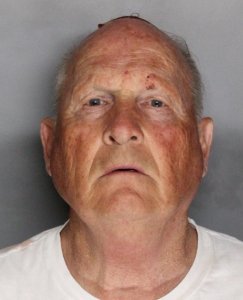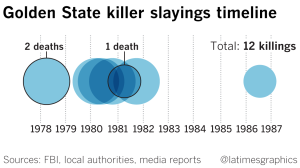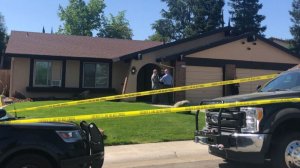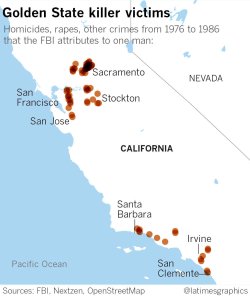For decades, Joseph James DeAngelo’s neighbors thought he was a little odd. He kept mostly to himself, sometimes yelling at the people who got too close to his fence or mowed their grass too early.
But they didn’t have any reason to suspect he might be behind a series of killings, rapes and assaults in the 1970s and 1980s that spawned an investigation that lasted more than 40 years — and, until recently, neither did authorities.

“We all knew that we were looking for a needle in a haystack,” Sacramento District Attorney Anne Marie Schubert said Wednesday at a news conference announcing DeAngelo’s arrest.
“It is fitting that today is National DNA Day,” Schubert said. “We found the needle in the haystack and it was right here in Sacramento.”
DeAngelo, 72, was taken into custody Tuesday evening in the Sacramento suburb of Citrus Heights. Police allege he is the so-called Golden State Killer, who is believed to have committed 12 killings and at least 50 rapes in at least 10 counties in California.
Detectives matched a discarded DNA sample from his home to evidence from the investigation, according to law enforcement officials who gathered outside the crime lab where the key break was uncovered. DeAngelo was arrested not far from where the Golden State killer committed some of his crimes.
While officials would not say what led them to seek DeAngelo’s DNA, they said his name emerged in connection with the crimes last week.
He was arrested without incident.
“When he came out of his residence, we had a team in place that was able to take him into custody. He was very surprised by that,” Sacramento County Sheriff Scott Jones said.
DeAngelo faces capital murder charges in connection with the killings of Katie and Brian Maggiore in 1978. He is being held without bail in Sacramento. He will be arraigned Friday afternoon.
He also is accused of murder by authorities in Orange and Ventura counties, according to documents and officials.
Related: Sacramento County criminal complaint in 1978 killings of Katie and Brian Maggiore
Related: Ventura County criminal complaint in 1980 killings of Charlene and Lyman Smith
Six years as a cop
“All too often we forget to talk about the victims, and today we at least brought the first step towards closure for those victims of these horrendous crimes,” Jones said.
The suspect is a former Auburn, California, police officer who was fired in 1979 for shoplifting a can of dog repellent and a hammer from a drugstore, according to Jones. He worked as a police officer in Exeter and Auburn between 1973 and 1979.

“Very possibly he was committing these crimes during the time he was employed as a peace officer, and obviously we’ll be looking into whether it was actually on the job,” Jones said.
Exeter Police Chief John Hall said, “It is absolutely shocking that someone can commit such heinous crimes, and finding out someone in a position of trust could betray that is absolutely unbelievable.”
The Auburn Police Department said it will “do everything within its power to support this investigation and any prosecution that follows.”
“We will pull out all the stops for our Sacramento-area law enforcement partners in this horrific and historic case.”
A CNN crew outside DeAngelo’s home saw investigators bring some bags of evidence out of the residence as they worked into the night.
Neighbors say he could be different
From 1976 to 1986, DeAngelo’s alleged crimes sowed fear across the state, where the suspect was also known as the “East Area Rapist” and “the Original Night Stalker.”
Kevin Tapia, who said he has lived near DeAngelo for 20 years, said neighbors could often hear DeAngelo yelling in his home. In recent years, he said DeAngelo had become a recluse, sometimes yelling at neighbors for minor annoyances, like mowing the grass too early in the morning.

“He’s not like an overly creepy person, but he definitely, you know, kept to himself and kind of was … a little different,” Tapia told HLN. “It was definitely some concern.”
George Hirsch, who said Wednesday he witnessed DeAngelo’s arrest, described the suspect as someone who was quiet most of the time but “a little bit out of control.”
Jane Carson-Sandler told HLN on Wednesday that she used to live in Citrus Heights — where DeAngelo was arrested and resided — when a man broke into her home, and raped her while she and her 3-year-old son were tied up.
“When I think back about all of the lives that he destroyed and all of the folks that he has affected over all of these years, I can’t help to get angry,” she said. “I want to punch him.”
Carson-Sandler became the first of the Golden State Killer’s recorded rape victims on June 18, 1976. In an HLN documentary on the case, she said she was dozing in bed with her son after her husband left for work. Then, she was abruptly awoken.
A masked man stood in the bedroom doorway, holding a large butcher knife and shining a flashlight at her face.
He bound her and her son with shoelaces and blindfolded and gagged them with torn sheets. After moving her son off the bed, he unbound Jane’s ankles.
“And then I knew what he was there for,” she said in the HLN documentary, in which she didn’t share her last name.
That first rape sparked the hunt for the man who authorities say went on to commit rapes and killings in California over the next decade.
Renewed interest in case
It’s been more than 40 years since the Golden State Killer’s first recorded attacks, which began in and around Sacramento in Northern California. No suspects were caught or even identified in the case. Police only had minor details about his looks, along with a sketch from an almost-victim.
In recent years, there was renewed interest in the case. This year, a book and a series from HLN were released, in the hopes of shedding more light on the case.

When the Sacramento-area rapes were first being reported, it was always by women who were alone or with their children. But by 1977, a year after Jane’s attack, the list of victims had expanded to couples in their homes.
Police believe the East Area Rapist killed the Maggiores after the couple — who were walking their dog at the time — spotted him before he broke into a home in Rancho Cordova, California, just outside Sacramento, in February 1978. Those were his first known homicides.
“We thought he would never stop, but then two months after the Maggiore homicides, the East Area Rapist left our jurisdiction. It was like he disappeared in thin air,” said Carol Daly, a retired detective from the Sacramento County Sheriff’s Department.
That’s when a serial attacker began terrorizing Santa Barbara County, California — more than 300 miles south of Sacramento. Police didn’t realize it at the time, but the attacker’s crimes fit the same pattern as Sacramento’s East Area Rapist. He attacked women and couples across Southern California from December 1979 to May 1986, and became known there as the Original Night Stalker.
“These cases are some of the most horrific I’ve had to investigate,” said Erika Hutchcraft, an investigator for the Orange County District Attorney’s Office. “They’re not a one-time, you know, crime of passion, but these are almost passionless crimes. Very cold, very violent.”
DNA changed the case
Even with such distance between Sacramento and Southern California, detectives in the north who heard about the Original Night Stalker believed he was the same perpetrator as the East Area Rapist.
“Over the years, we heard of homicides down in Southern California, and we thought it was the East Area Rapist,” said Larry Crompton, retired detective for Contra Costa County Sheriff’s Department. “But he would not leave fingerprints, so we could not prove, other than his M.O., that he was the same person. We did not know anything about DNA.”
Once DNA tests were available to investigators, they were able to confirm the same man committed three of the attacks that had previously been blamed on the so-called East Area Rapist, according to Paul Holes, who investigated the case for the Contra Costa County District Attorney’s Office.
“That’s when I reached out to Orange County” in Southern California, he says, “just to see, you know, if the East Area Rapist DNA was a match with the Original Night Stalker.”
In 2001, DNA evidence determined the East Area Rapist was the same offender as the Original Night Stalker.
In 2016 — 40 years after his first attack — the FBI offered a $50,000 reward for any information that could lead to his arrest and conviction.
“The sheriff’s department never gave up on this investigation,” Detective Paul Belli of the Sacramento County Sheriff’s Department said at the time. “This person ruined a great number of lives, and he should be held accountable.”
Note: Unless stated otherwise, the interviews from this story came from the HLN series “Unmasking A Killer.”












